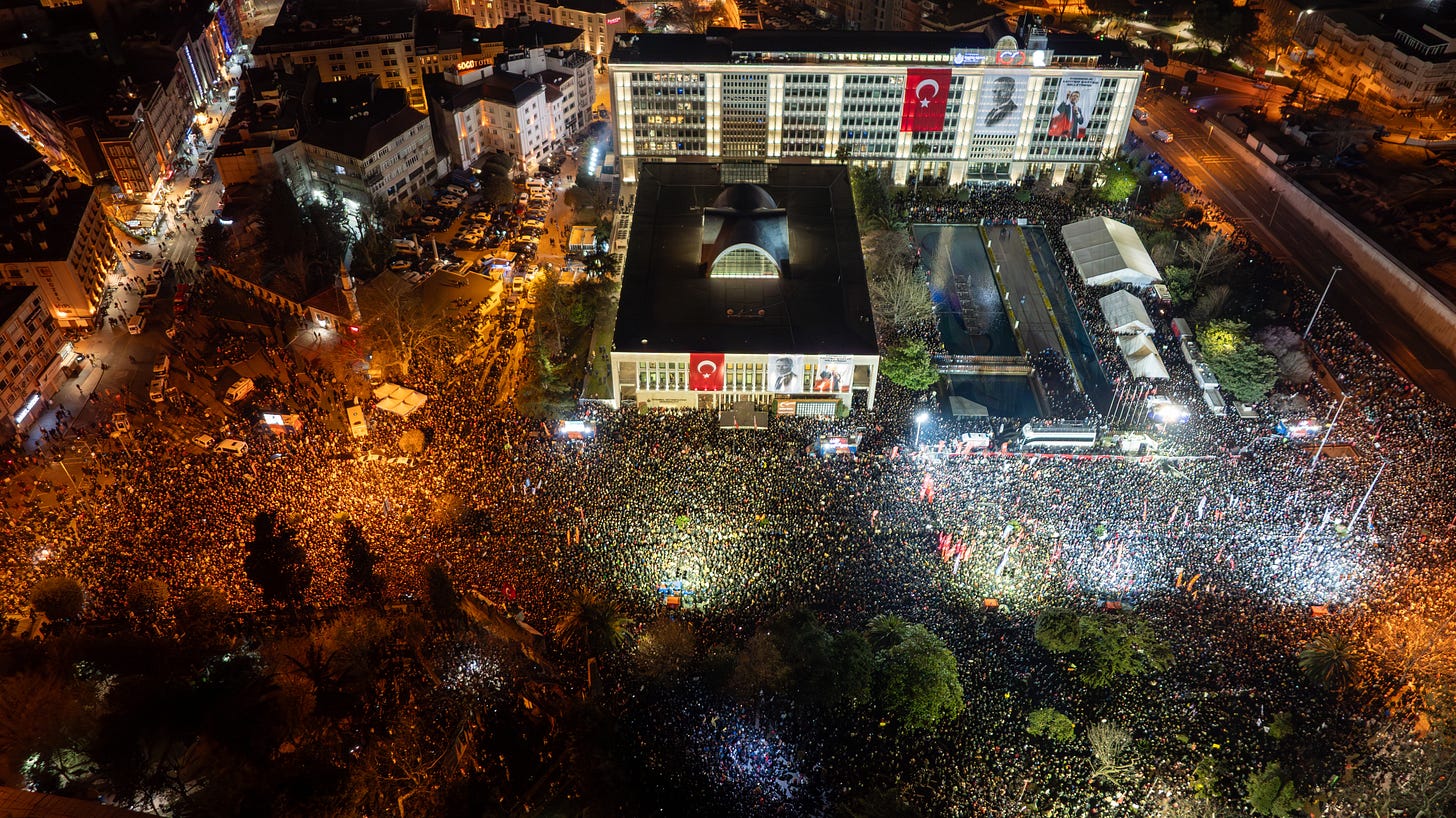The Turkish Fight for Democracy
In the wake of the arrest of an important opposition politician, Turkish President Erdogan faced extended protests for greater democracy
In 2025, Turkey faces mounting anti-government protests, drawing parallels to Bangladesh’s unrest the previous year. In 2024, Bangladeshi students led an “anti-discrimination” movement against a perceived unjust quota system. The protests overthrew the regime, bringing an interim civilian government to power as Prime Minister Sheikh Hasina fled to India
In March 2025, pro-democracy, anti-government protests erupted in the Mediterranean nation of Türkiye. Protests hinged around a central issue: Turkish President Recep Tayyip Erdoğan’s administration, which observers have called undemocratic, had arrested a high-profile opposition leader poised to rival Erdoğan. Istanbul’s Mayor Ekrem Imamoglu was arrested by Turkish judicial branch authorities on corruption charges on Mar 19..
The anti-government protests in Türkiye have drawn in diverse segments of Turkish society, including supporters of Imamoglu, the Turkish youth, the socialist left and the nationalist right. These groups have different ideological backgrounds but similar reasons for protesting: Erdoğan, who has been in politics since the early 1990s and president since 2014 has become an authoritarian, and has reduced Turkey’s secular spirit and democratic laws.
Initial reactions to the arrest were mixed. While the Erdoğan administration denied any government involvement or influence over the judiciary, European leaders and parties called the arrest a politicized and anti-democratic move. Human rights NGOs and the United Nations have condemned the arrest, as well as the use of excessive force by police forces on the protestors.
The belief that the arrest was a political move by the Erdoğan administration stems from the fact that Imamoglu had led Erdoğan in presidential opinion polls for months. Moreover, Imamoglu’s party, the Republican People’s Party (CHP) beat Erdoğan’s Justice and Development (AK) Party in a shock local election result in 2024. Additionally, the timing of the arrest gives more credence to the politicized arrest theory: Imamoglu was arrested only four days before he was set to be designated as the opposition party’s presidential candidate.
Authorities in Istanbul have banned the protests and closed some roads “to maintain public order” and prevent any “provocative actions that may occur.” Yet, the protests, which have continued since the initial arrest, show no signs of slowing down. Protestors have organized public rallies, economic boycotts, and calls to embargo goods associated with the Erdoğan administration are continuing. While the protests have been largely peaceful, the government has conducted a crackdown. Nearly 2,000 people have been detained with 300 of them jailed pending trial.
President Erdoğan said in a speech that authorities "would not allow public order to be damaged," and vowed not to "give in to vandalism or street terrorism."
The Turkish political apparatus has also started cracking down on freedom of the press, arresting at least seven journalists who were covering the protests. Reporters without Borders reports that 90% of the national media in Türkiye is controlled by the government. Meanwhile, US-based nonprofit research organization Freedom House labelled Türkiye as “not free” when it comes to internet and media freedom, citing several laws created by Erdoğan’s Justice and Development Party that " increase surveillance and censorship and criminalize online speech.” All these factors indicate the depreciating press freedom and democratic rights in the Mediterranean nation.
Meanwhile, Özgür Özel, the current leader of Imamoglu’s Republican People’s Party, has stated that he will keep fighting to free Imamoglu and others who were arrested on what he considers illegitimate charges. To that end, Özel has promised a new protest in a different city every weekend, as well as regular demonstrations in Istanbul, Imamoglu’s home city. Additionally, he also called for presidential elections to be moved up from 2028 to “at least November” of this year, threatening Erdogan’s position.
The Georgetown Review reached out to a student with roots in Turkey, who had the following to say:
"Georgetown, where open dialogue and civic engagement are core values, really highlights the contrast with what’s happening back home in Turkey. Seeing my peers here speak freely makes me reflect on how essential- and fragile-those freedoms are for my own country."
The name of the student has been retracted to protect their anonymity.
Protests continue in Turkey as the country challenges authoritarianism and continues to fight for a democratic future.
BROADER IMPLICATIONS:
These recent developments in Türkiye carry significant geopolitical weight. Türkiye, a NATO member country, is formally allied with the United States, and hopes to acquire European Union (EU) membership.
On April 9, 2025, the European Parliament argued that Türkiye’s accession process must remain on hold. The Parliament opined that Europe does not believe in cutting corners when it comes to democratic values and highlights that the Turkish government has not done enough to fix its non-democratic tendencies. The Parliament, which voted 48-3 (with 23 abstentions) in favor of pausing Türkiye’s accession process, specifically mentioned the recent crackdowns on political dissent in Turkey related to Imamoglu’s arrest. Members of the European Parliament (MEPs) held that EU membership is tied to upholding certain standards on the freedom of speech and assembly, having stable, democratic institutions, and the rule of law. Moreover, the Turkish opposition questioned Erdoğan on whether the Imamoglu arrest was sanctioned by the United States.
Türkiye has emerged as a significant player in European, Middle Eastern, and African affairs under Erdoğan and today plays a significant role in shaping the future of these regions. Its future will have spillover effects that bring geopolitical change to these parts of the world.




